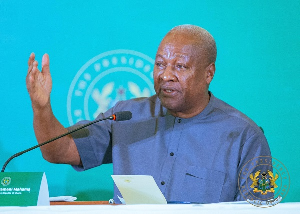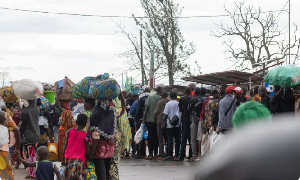Elmina, (C/R) Oct. 25, GNA- Professor Emmanuel Owusu-Bennoah, Director-General of the Council for Scientific and Industrial Research (CSIR), has tasked African scientists to ensure that research developed to enhance agricultural technologies, were appropriate to the circumstances of targeted farmers groups. They should cater for factors that influence farmers' decisions, such as crop technology, the natural environment such as rainfall and the economic environment such as products markets, goals, preferences and resource constraints.
Prof. Owusu-Bennoah, made the call in a keynote address at an 'International Workshop on the Convergence Of Science (COs)- Inclusive technology innovation processes for better integrated soil and crop management', for representatives of international research organisations, policy makers, academics and farmers representatives, which opened at Elmina on Tuesday.
The COS project is a joint initiative of the Universities of Ghana, Abomey-Calavi in Benin and Wageningen in the Netherlands and is among others, geared towards ensuring that research outcomes fit the needs and conditions of small- scale farmers, and to reflect on whether scientific institutions are conducive to fostering convergence, with an overall objective of ensuring food security on the continent. The four-day workshop, is being attended by 80 participants from Ghana, Benin, Italy, Mali, Niger, Zimbabwe, Zambia, Tanzania, Ethiopia, Kenya, and Eritrea, and is under the theme " Convergence of sciences for agricultural development using science and technology for Africa's development."
The CSIR boss, pointed out that this was imperative, as research had shown that if technologies are appropriate to farmers' circumstances, "they will at all cost rapidly adopt them," stressing that as agricultural researchers, their work could be said to be successful, if their technologies were adopted by a large number of farmers.
He observed that in many countries in sub-Saharan Africa, agricultural research and development has been traditionally organised in the 'top down' or transfer of technology model extending from researcher through dissemination by the extension services to farmers.
Prof. Owusu-Bennoah, however, pointed out that although this model was popular, it did not utilize the farmers' tacit knowledge about their physical, socio-economic and political environments, resulting in research-based technologies remaining on the shelf because they do not meet farmers' requirements.
This shortcoming, according to Prof. Bennoah, was compounded by the farmers' lack of capital to fund adaptation of technologies to their particular needs and their aversion to the risk of failure, which could devastate their livelihoods.
In this regard, he expressed happiness that the COS, was focusing on the need for new ways for creating indigenous knowledge and grassroots technological innovation into formal research and development endeavours and by changing the incentive systems that structure the habits, practices and norms of the research community. According to him, the problem of poor adaptation of agricultural technologies had been a great concern to those tasked with the responsibility of generating technologies, because food and nutrition security still remained Africa's most fundamental challenge as well as challenges of meeting the Millennium Development Goals of halving the number of undernourished by 2015.
The COS, he said, was therefore providing an opportunity for all actors in the "technology generation", dissemination and utilization chain as well as academics to come together to pool resources to resolve the poor uptake of agricultural technologies developed by scientists. Prof. Owusu- Bennoah, therefore, called for collaboration between the COS and the West and Central African Council for Agricultural Research and Development (CORAF/WECARD) and the Agricultural Research in Africa (FARA) to enhance strategies towards food security on the continent.
In an opening address read for him, Ghana's Minister of Food and Agriculture, Mr. Ernest Debrah, noted that poverty in Ghana was largely a rural phenomenon, accounting for some 75 per cent of national poverty, and was predominant within the food and cash crop farmers, although the situation among cash crop farmers had improved in recent years.
The Minister said, the government, to stem the situation, recognized the need to improve economic performance and welfare of the people and had made growth and poverty reduction the major thrusts, as enshrined in the GPRS.
He said in order to achieve these objectives, agriculture, which is the largest sector of the economy had been targeted and a number of interventions proposed, such as the Food and Agricultural Sector Development Policy (FASDEP) to provide a holistic framework for food and agriculture.
Mr. Debrah said the government also recognized the role of effective science and technological research for socio-economic development, as a result of technology development had been included in policies to develop the agricultural sector.
The Minister compared dissemination of research information within developed and developing countries, and said this was "weak" within developing countries, and was hopeful that the COS project, would provide some insights on enhancing distributional impact of agricultural research.
Prof. Arnold van Huis, International Project Coordinator for COS, in an overview of the project, said it was aimed at enhancing "windows of opportunities for farmers' whom, he said, had enormous capacities for innovations, had limited possibility for marketing, and government and institutional support.
In his welcoming address, the acting Vice-Chancellor of the University of Ghana, Prof. Clifford Tagoe, expressed concern that Africa remained the only region in which food insecurity was rising, with the number of people and countries facing famine, hunger and under-nutrition increasing.
He said to change the situation, there was the need to use science to influence the activities and processes of agriculture.
General News of Tuesday, 25 October 2005
Source: GNA












